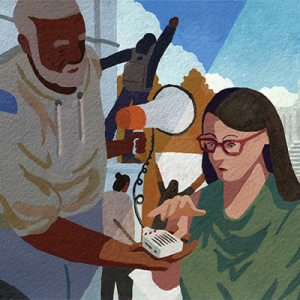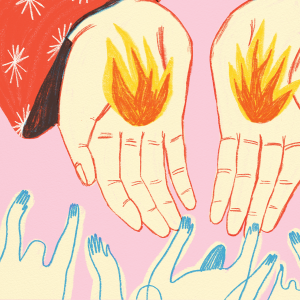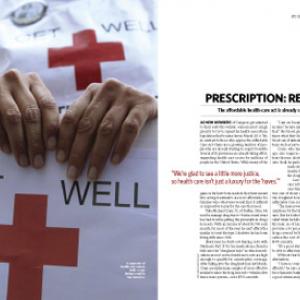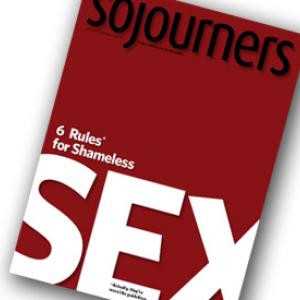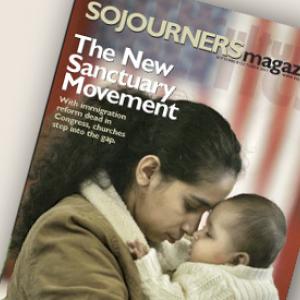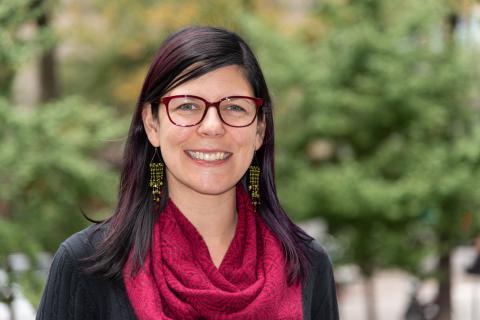
Celeste Kennel-Shank, author of What You Sow Is a Bare Seed: A Countercultural Christian Community During Five Decades of Change, is an ordained Mennonite minister living in Chicago.
Posts By This Author
How Is God Calling You Now?
A DELIGHTFUL DISCOVERY I made while researching a countercultural Christian community in Washington, D.C., was the book Gifts of Grace by Mary R. Schramm. In 1965, Mary and her husband, John, started the Community of Christ. The community intentionally wove together a deepening faith, activism for peace and justice, and shared life with other Christians from the raw starting material of honoring each person’s unique contribution. Discerning each one’s gifts was a way of learning about God’s will for their lives, individually and collectively. “I don’t care whether you’re 8 or 80,” Schramm wrote, “you are responsible for finding out the things that God would have you do.” To do that, she encouraged paying attention to what one enjoys. “I don’t think God gave you a gift or an ability to make you miserable,” Schramm said in a talk about her book. “God made us to be fulfilled by the gifts that God gave us.”
The idea of “being called” by God can be intimidating. It can also be misused — for example, when someone is convinced that they should determine what your calling is or is not, or when someone erects barriers to exclude the callings of others. An intimation of God’s call can also spur feelings of self-doubt or unworthiness, as it did initially for the prophets Isaiah and Jeremiah. Yet, in their stories we see a God who chooses individuals and calls them amid their struggles. What might be perceived as a weakness can be turned into a strength through the gift of God’s grace. Imagine! A God who wants us just as we are.
There Is Always a Way Out
THE PROPHETS ARE not the first biblical voices I turn to when hope is in short supply. Rather, reading them, I often think: Here we are again. Then as now, society and the world are barreling full speed toward devastation. Those in power put their faith in all the wrong places, followed by crowds of misguided people. Imagining how this will further unspool leads me to the edge of despair.
Yet, when I dug into the passages from the prophet Isaiah in this month’s readings, I found hope. If all were already lost, there would be no point to the prophet’s work. Instead, Isaiah proclaims that individual and social change are and continue to be possible — and then points the way, as Daniel Berrigan explains in his poetic commentary Isaiah: Spirit of Courage, Gift of Tears. “Just as despair is the ignoble stock-in-trade of the world’s systems,” Berrigan writes, “hope is the noble stock-in-trade of the prophet.” Isaiah’s exhortations are “skillfully laved in tenderness,” he writes. Isaiah sees what we see from the precipice, then holds out a hand to draw us back from it.
To draw back requires turning around. Rabbi Abraham Heschel writes that believing people to be capable of repentance “saved the prophets from despair. ... History is not a blind alley, and guilt is not an abyss. There is always a way that leads out of guilt: repentance, or turning to God.” Isaiah and the prophetic tradition remind us: Even though we’ve been here before — between disaster and consequences to come — God has been here, too.
Holy Spirit in the Struggle
EARLY ON IN my training for hospital chaplaincy the spiritual care director asked each student to choose a biblical role model of faith. I chose the Apostle Paul. It wasn’t an obvious choice for someone raised as a feminist and aware of the damage done to women through interpretation of Paul’s letters and those attributed to him.
Despite that, I love the way Paul’s faith and humanity shine through his words. Even in his letter to the Romans, one of Paul’s last and most-polished, we have a sense of his limitations. He mixes confidence and humility, offering an unflinching look at sin: collective sin and the sin that is particular to each of us, broken beloveds of God.
I need Paul’s writing on sin so that I don’t grow too self-righteous. When Paul writes that we received God’s grace “while we were still weak” (Romans 5:6), I am reminded that I can’t claim righteousness before God on my own. It is only when we have an honest estimation of ourselves and our capabilities that we can engage in justice work without moralizing or neglecting to set good boundaries.
Taking sin seriously means not only fighting back against oppression but taking a hard look at myself. In my feminism, am I aware of and working to end the ways misogyny particularly oppresses black, brown, Asian, and Indigenous women, as well as queer and trans people? Do I put my own concerns first or truly seek liberation for all people?
June 7
With Us Always
Genesis 1:1-2, 4; Psalm 8; 2 Corinthians 13:11-13; Matthew 28:16-20
READING THE CREATION story in Genesis, I imagine myself deep inside a dark place, with the breath of God like a gust of wind. I recall James Weldon Johnson’s poem “The Creation,” especially as it is read by James Earl Jones in a short film featuring animated clay art by Joan C. Gratz. The darkness through which God births the world is “blacker than a hundred midnights / down in a cypress swamp.” From that rich blackness comes the countless colors of the myriad creatures that dwell on the earth.
Pentecost's Unfinished Story
THE HOLY SPIRIT has a starring role leading up to Pentecost, not only on the day itself. Jesus prepares the apostles to receive “another Advocate.” Other readings jump forward to what occurs when disciples are filled with the Holy Spirit. This could be an unusual level of holiness meant for a few, but it sounds like a holiness to which we can all aspire. Stephen and the apostles were granted heavenly visions or the ability to speak new languages. The challenge for believers today is to recognize when the Spirit of truth “comes upon” us.
A clue might be found in how Jesus describes the approach of the Holy Spirit to the disciples (Acts 1:8): This verb (eperchomai) conveys the sense of moving from a transcendent position toward one who is less powerful. The writer of Luke-Acts also uses the verb in this way when Gabriel answers Mary’s question about how it could be that she will bear the Messiah.
Mary, the apostles, Stephen, and others weren’t powerful to begin with. It is the Spirit who empowered them, who made risky discipleship possible. And the “signs and wonders” (Acts 5:12) that flow from being full of the Spirit aren’t always spectacular. We could be filled with the Spirit when we turn a vacant lot into a community garden. Or when we register new voters. Or furnish a home for a family seeking asylum. We don’t need a certain level of education, status, or holiness to live into Jesus’ promise that his followers can receive power to do great works (John 14:12).
May 3
Churches ‘Heal’ Debt
Acts 2:42-47; Psalm 23; 1 Peter 2:19-25; John 10:1-10
AMID “SIGNS AND wonders” by the apostles, Acts 2 describes how early Jesus followers provided for each other by selling off possessions and goods, praying together, sharing meals, and holding property in common. That may seem an impossible ideal.
But sharing resources beyond our individual household can be creative while supporting communal stability and security. The early Christians intertwined worship with economic relationships and forged bonds of community. Congregations can do this in diverse ways.
Several Chicago-area congregations have helped to raise money for canceling medical debt through a nonprofit organization called RIP Medical Debt. RIP uses the same method as debt collectors—it buys debt in bulk from brokers at a deep discount—except RIP then collects donations to clear the debt. Individual contributions as small as 50 cents or a dollar from people in the pews together wiped out thousands of dollars of medical debt, freeing a family. Members of the participating congregations rejoiced in worship that they could relieve financial stress, even while many of them also had such debt.
Why National Flags Don't Belong in Church
When I first heard the announcement to rise for "the presentation of the colors," I didn't understand what that was.
Building Together on the Rock
Churches Supporting Churches gets congregations into partnership -- and policy.
The New Environmental Advocates
Chicago's Wilbur Wright College helps workers turn blue collars to green.
Stem Cells and Human Dignity
No Time for Retreat
Mr. Peabody's Coal Train
Beginning with churches near the coalfields, more than 750 local and national religious leaders have put forth “A Call for Justice at Peabody Energy” that backs miners seeking to organi
Toward a Responsible Sexual Ethic
Since 2004, a diverse group of religious leaders, reproductive rights advocates, and medical professionals have met to talk about sex.
Fashion With A Passion
Connecting creativity and spirituality, the Reciprocity Foundation, a Brooklyn, New York-based gift and design organization, steers homeless youth toward careers in the design, media, and fashion i
Taking A Ride In The Poverty Simulator
Complete with play money, appliance cards, and transportation passes, the Community Action Poverty Simulation is much like a role play or board game.
Blessing the Hands That Harvest
Bumper stickers found in many college dormitories and church parking lots during the recent boycott of Taco Bell featured a Spanish-speaking Chihuahua—playing off the chain’s ads—turning down the fast- food chow to demand a penny more per pound for tomato pickers.
Heading the campaign was the Coalition of Immokalee Workers, a farm worker-led organization based in Immokalee, Florida, with more than 2,500 members, most of whom are Latinos, Haitians, and Mayan Indians. The nearly four-year boycott put worker concerns—low wages, poor working conditions, and discrimination—in front of many consumers and led to an agreement with Yum! Brands, Taco Bell’s parent company.
The campaign is one of several recent examples of tapping into the power of consumers. Through education, boycotts, and other methods, farm workers can make those who eat the products they grow and pick aware of the conditions they experience—and ask for their help in changing those conditions.
“The life of an agricultural worker is one of exploitation,” said Lucas Benitez, a worker and organizer with the coalition who came to the U.S. from Mexico as a teenager. Farm laborers work long hours, with no benefits, health care, or overtime pay, he said. “The imbalance of power is tremendous.”
The agreement reached by the coalition and Yum! Brands established important precedents of increasing wages coming down the supply chain and involving workers in the monitoring of conditions in the fields, said Brigitte Gynther, an organizer with the coalition. The change for workers has been immediate, Benitez said, after more than 20 years of receiving the same salary. Each week, he said, “depending on how much they harvest, they receive between $15 and $40 more.” Also essential, Gynther said, are the safeguards against what the coalition believes to be inhumane working conditions the pickers have suffered.
Anti-trafficking Success
After unanimous votes in Congress, President Bush signed into law in early January the Trafficking Victims Protection Reauthorization Act of 2005, drawing praise from human rights and religious g
Revealing Hidden Histories
In addition to providing services to the elderly, We Are Family helps volunteers tap in to the history of African-American communities in Washington, D.C. Through casual visits as well as oral history projects, volunteers sometimes are able to uncover accounts of major events in U.S. history.
We Are Family volunteers have given Belva Simmons, 78, who lives in D.C.’s North Capitol neighborhood, a chance to tell the story of her career as a congressional staff person and her role in passing the Civil Rights Act of 1964.
Good Samaritans
Shanti Sellz and Daniel Strauss, both 23, face felony charges for aiding people in the Arizona desert who crossed the U.S.-Mexico border. Their appeal to have the case against them dismissed was denied in January. Sellz and Strauss are volunteers with No More Deaths, a Tucson, Arizona-based coalition of faith-based groups that advocates for immigrant reform and provides food, water, and medical care to migrants crossing the desert.
